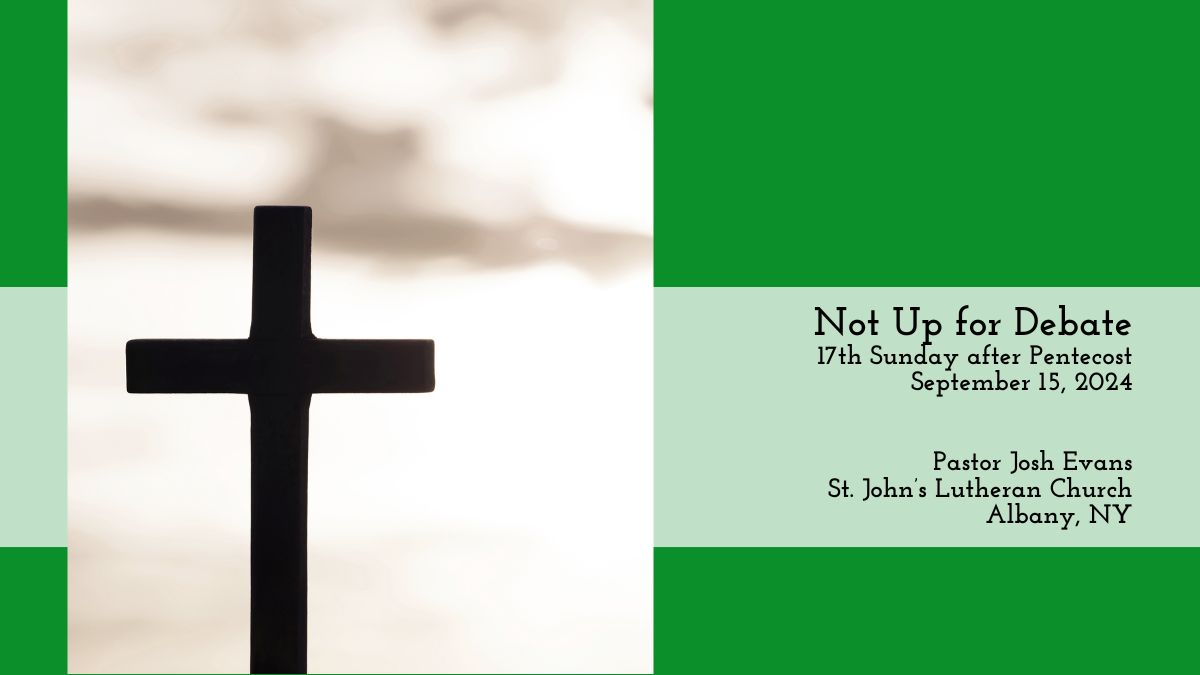St. John’s Lutheran Church
15 September 2024 + Lectionary 24b
Mark 8:27-38
Rev. Josh Evans
The stage is set, and the debate is ready to begin.
Each party has taken their place at the podium,
ready to defend their platform,
and the moderator asks the first question:
“Who do people say that I am?”
The disciples, in turn, offer various popular responses:
John the Baptist. Elijah. One of the (other) prophets.
Each vying for their own particular interpretation –
of what they’ve heard,
of who they want Jesus to be.
“But,” turning to the last of them, the moderator presses,
“who do you say that I am?”
“You are the Messiah.”
No sooner does the answer leave Peter’s lips
than he is confronted by the reality of what he has just said:
This Messiah must undergo great suffering,
be rejected,
and be killed.
Maybe Peter and the disciples expected a “Make Israel Great Again” campaign:
Jesus is the Messiah, the Anointed One, the long-promised deliverer who would save God’s people – and crush their imperial oppressors and political enemies, to dominate and emerge victorious, and to restore Israel’s status and prestige.
Except that’s not what Jesus has in mind.
It’s hardly a coincidence that Jesus brings this up now,
on the way to Caesarea Philippi –
a Roman colony near a temple dedicated to Rome and its emperor.
You know who else liked to use titles like “Anointed One” for himself?
The emperor.
Against this imperial geographic backdrop,
Jesus teases out questions about his identity.
Yes, he is the Messiah, the Anointed One, the Deliverer –
but not in the way the disciples have come to expect.
This Messiah will not dominate and conquer by military might or violent insurrection, nor by self-centered and self-serving power that seeks to preserve itself at all costs (like Caesar).
No.
This Messiah will lead a revolution, but …
it will be a revolution of love and mercy, service and justice.
A revolution marked by doing the very things he has been doing up to this point that have attracted so much attention:
healing people and feeding them,
delivering them from pain and isolation,
welcoming those who have been outcast
and offering them a place of belonging and dignity at the table.
This revolution is a direct affront to the empire that seeks to dominate and control precisely because this revolution offers life, mercy, and liberation.
This is the kind of Messiah that Jesus is:
not the self-serving Caesar,
but a self-emptying servant.
This is the kind of life that Jesus calls his disciples and the crowds to:
Deny yourself. Take up your cross. Follow me.
***
Because the Bible has far too often been used in harmful ways,
I also want to be perfectly clear about what Jesus is not saying:
The invitation to take up our cross is not a justification for enduring abuse, illness, or injustice (“That’s just my cross to bear.”)
It is also not to suggest that suffering of any kind is divinely sanctioned,
or that there is “redemption” in such suffering.
Far too often, preachers have wielded such a message from their pulpits,
and I want to perfectly clear:
That is spiritual abuse, and it has no place in the message of Jesus.
***
Instead, when Jesus calls his disciples and the crowds
to deny themselves, take up their cross, and follow him,
it is a powerful and subversive invitation –
to renounce the self-centered and self-serving nature of the empire,
to give up all ambitions for power and domination,
and to instead choose the way of God,
the way of the Gospel,
the way of mercy, love, and justice.
It is so radically different from anything the disciples have to come to expect –
so different from what they’ve heard,
so different from who they want to Jesus to be,
so different from the way of empire and “might makes right.”
And yet there is a tinge of something eerily familiar here:
This way is risky.
This way might even lead to the cross – language which would have been crystal clear in a political climate that used the threat of violence and death to silence its enemies.
As the late Black Liberation theologian James Cone has said
and as I’ve often quoted before:
“If you are going to worship somebody that was nailed to a tree,
you must know that the life of a disciple of that person is not going to be easy.”
To commit ourselves to the way of Jesus –
the way of mercy, love, and justice –
is not always going to be easy or comfortable.
If you prefer easy and comfortable –
Jesus says –
turn back now. This isn’t for you.
But, if you want a way that offers something radically different, and hopeful:
Deny yourself. Take up your cross. Follow me.
Jesus invites us to let down our guard,
to unclench our fists, and to be opened –
to a way of living love,
for the sake of our neighbors in need,
for the sake of a hurting world.
The church is not called to make itself great,
but to empty itself.
To offer itself for others, as Christ offers himself for us,
beckoning us into a new way … Follow me…
Follow me into the beautiful moments of healing and feeding and liberating.
Follow me when the path gets rocky and you lose your footing.
Follow me when this message of love and inclusion is mocked and ridiculed.
Follow me into resurrection and new life on the other side.
Who do you say this Jesus is?
This Jesus is the Messiah –
who suffers as we suffer,
who is rejected as we are rejected,
who has been where we are and promises that we are not alone,
a Messiah who has been raised and who raises us to new life.
And that, dear church, is not up for debate.



